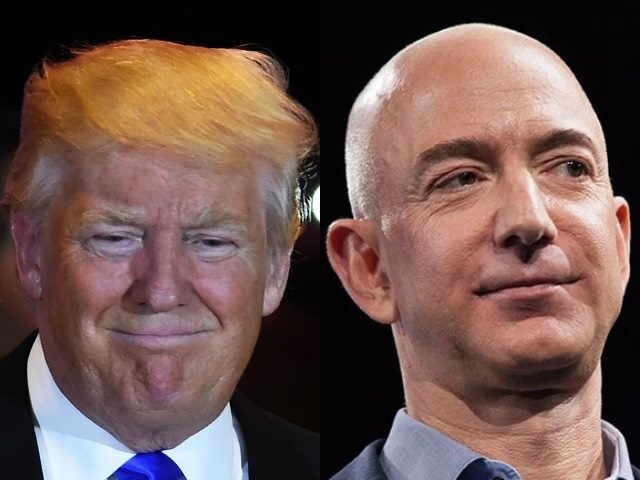Donald Trump and Jeff Bezos, founder of Amazon and owner of The Washington Post, disagree on taxes, encryption, and, of course, who should be the next president. Rather strongly, in fact, on all three questions.
The Post slammed Donald Trump, yet again, on May 19. But this time, the headline was much more personal: “‘Not an appropriate way for a presidential candidate to behave’: Bezos fires back at Donald Trump.”
In the article, Post reporter Paul Farhi loyally quoted Bezos’ extensive criticism of Trump and then added, with a determined attitude of admiring docility toward his boss, “[Bezos] offered a vigorous defense of freedom of the press: ‘It’s critical that we be able to carefully examine our leaders.’”
Interestingly, Bezos’ sharp words came after Trump attacked Bezos, Amazon, and the Post all at once, saying, among other things, that Bezos was using the Post to advance an obvious political agenda. Indeed, the obviousness of that political agenda became fully manifest on May 11, when the Post‘s Bob Woodward told the world that the paper had 20 staffers investigating Trump. Yes, that’s right, 20 diggers. That many on Hillary? Woodward didn’t say. And of course, in the meantime, every day, the Post runs easily a half-dozen articles, editorials, and op-eds either praising Hillary Clinton or blasting Trump.
So what’s going on? Part of the explanation, of course, is that the Post is a liberal newspaper, which always—long before Bezos bought it in 2013—endorses the Democratic presidential candidate and the liberal-left line.
Yet there could be still more going on. Specifically, the Bezos/Post agenda seems to also include direct financial benefit to Bezos—net worth, already, according to Forbes, more than $60 billion. As Trump said earlier this month, Bezos is “getting away with murder, tax-wise. He’s using The Washington Post for power so that the politicians in Washington don’t tax Amazon like they should be taxed.” Trump has also indicated that he thinks Amazon is a flagrant antitrust violator that’s a view widely shared by, for example, book authors.
For its part, the Post’s Paul Farhi, dutiful employee that he is, contented himself with simply quoting Bezos on the tax and antitrust question: “I’m very, very comfortable with all of Amazon’s approaches and behaviors, [such as] the way we pay taxes.”
So does Bezos’ smug assertion settle the matter? Maybe not. The Post didn’t note, for example, that the record strongly suggests that Amazon pays just a tiny fraction of the statutory corporate tax rate of 35 percent. But according to The New York Times, Amazon pays just six percent (these data are from 2007 to 2012; it seems unlikely that Amazon’s tax rate has gone up since).
Interestingly, candidate Trump has called for a dramatic cut in the US corporate tax rate, which is the highest in the world, down to a more competitive 15 percent. Yet even at 15 percent, if collected, that would spell be a huge tax increase for Amazon, as well as other globalized tech companies, such as Google and Facebook.
So maybe that’s why Bezos is happy with the Post’s constant crusade against Trump. Maybe he wants Hillary Clinton to win. Sure, sure, Clinton has said that she wants to raise taxes on “fatcats,” but is it really likely that if she wins the White House she will sock it to the very people who helped her get there?
Yet if liberal ideology and taxes are two issues that separate Bezos and his paper from Trump, we can add a third, which is perhaps the most important of all: homeland security. Yes, Bezos and Amazon have sided with Apple on the key issue of encryption, which is to say, the issue of national, as well as homeland, security.
And another Post story loudly tells that tale:
Amazon chief executive Jeffrey Bezos said Wednesday his company is wholly aligned with Apple in its fight against government investigators who asked Apple to break its own encryption programs so they could gain access the iPhone used by one of the San Bernardino, Calif., terrorists.
So here again, Trump and Bezos are on the opposite sides. Trump has not addressed Amazon’s position on encryption, but he has loudly criticized Apple’s stated policy of non-cooperation. As he said on February 17, “Who do they think they are?” adding, “We should use common sense… we should open it up.”
Of course, Apple did not relent, and the Obama administration, perhaps mindful of a big donor, did not press the issue with Apple. And so, on February 19, Trump, who had previously used Apple products, announced that he would henceforth be boycotting Apple. And, in fact, Trump now uses a Samsung. And one might guess that Trump will boycott Amazon, too, since it is now avowedly on the same team as Apple.
So as we can see, this November, the American people will have a choice: Trump or Bezos. In additional to all his other campaign goals, Trump stands for making big companies pay their fair share, for enforcing anti-trust laws, and for keeping America safe—and oh yes, for winning the presidency so he can make America great again.
And by his actions, and those of his minions, Bezos is seemingly against all of those goals.

COMMENTS
Please let us know if you're having issues with commenting.